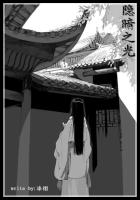The deaf man gazed at her. He understood this pantomime.The poor bellringer's eye filled with tears, but he let none fall.All at once he pulled her gently by the border of her sleeve.She turned round.He had assumed a tranquil air; he said to her, —
“Would you like to have me bring him to you?”
She uttered a cry of joy.
“Oh!go!hasten!run!quick!that captain!that captain!bring him to me!I will love you for it!”
She clasped his knees. He could not refrain from shaking his head sadly.
“I will bring him to you, ”he said, in a weak voice. Then he turned his head and plunged down the staircase with great strides, stifling with sobs.
When he reached the Place, he no longer saw anything except the handsome horse hitched at the door of the Gondelaurier house; the captain had just entered there.
He raised his eyes to the roof of the church. La Esmeralda was there in the same spot, in the same attitude.He made her a sad sign with his head; then he planted his back against one of the stone posts of the Gondelaurier porch, determined to wait until the captain should come forth.
In the Gondelaurier house it was one of those gala days which precede a wedding. Quasimodo beheld many people enter, but no one come out.He cast a glance towards the roof from time to time; the gypsy did not stir any more than himself.A groom came and unhitched the horse and led it to the stable of the house.
The entire day passed thus, Quasimodo at his post, la Esmeralda on the roof, Phoebus, no doubt, at the feet of Fleur-de-Lys.
At length night came, a moonless night, a dark night. Quasimodo fixed his gaze in vain upon la Esmeralda; soon she was no more than a whiteness amid the twilight; then nothing.All was effaced, all was black.
Quasimodo beheld the front windows from top to bottom of the Gondelaurier mansion illuminated; he saw the other casements in the Place lighted one by one, he also saw them extinguished to the very last, for he remained the whole evening at his post. The officer did not come forth.When the last passers-by had returned home, when the windows of all the other houses were extinguished, Quasimodo was left entirely alone, entirely in the dark.There were at that time no lamps in the square before Notre-Dame.
Meanwhile, the windows of the Gondelaurier mansion remained lighted, even after midnight. Quasimodo, motionless and attentive, beheld a throng of lively, dancing shadows pass athwart the many-colored painted panes.Had he not been deaf, he would have heard more and more distinctly, in proportion as the noise of sleeping Paris died away, a sound of feasting, laughter, and music in the Gondelaurier mansion.
Towards one o'clock in the morning, the guests began to take their leave. Quasimodo, shrouded in darkness watched them all pass out through the porch illuminated with torches.None of them was the captain.
He was filled with sad thoughts; at times he looked upwards into the air, like a person who is weary of waiting. Great black clouds, heavy, torn, split, hung like crape hammocks beneath the starry dome of night.One would have pronounced them spiders'webs of the vault of heaven.
In one of these moments he suddenly beheld the long window on the balcony, whose stone balustrade projected above his head, open mysteriously. The frail glass door gave passage to two persons, and closed noiselessly behind them; it was a man and a woman.
It was not without difficulty that Quasimodo succeeded in recognizing in the man the handsome captain, in the woman the young lady whom he had seen welcome the officer in the morning from that very balcony. The place was perfectly dark, and a double crimson curtain which had fallen across the door the very moment it closed again, allowed no light to reach the balcony from the apartment.
The young man and the young girl, so far as our deaf man could judge, without hearing a single one of their words, appeared to abandon themselves to a very tender Tête-a-Tête.The young girl seemed to have allowed the officer to make a girdle for her of his arm, and gently repulsed a kiss.
Quasimodo looked on from below at this scene which was all the more pleasing to witness because it was not meant to be seen. He contemplated with bitterness that beauty, that happiness.After all, nature was not dumb in the poor fellow, and his human sensibility, all maliciously contorted as it was, quivered no less than any other.He thought of the miserable portion which Providence had allotted to him; that woman and the pleasure of love, would pass forever before his eyes, and that he should never do anything but behold the felicity of others.But that which rent his heart most in this sight, that which mingled indignation with his anger, was the thought of what the gypsy would suffer could she behold it.It is true that the night was very dark, that la Esmeralda, if she had remained at her post, was very far away, and that it was all that he himself could do to distinguish the lovers on the balcony.This consoled him.
Meanwhile, their conversation grew more and more animated. The young lady appeared to be entreating the officer to ask nothing more of her.Of all this Quasimodo could distinguish only the beautiful clasped hands, the smiles mingled with tears, the young girl's glances directed to the stars, the eyes of the captain lowered ardently upon her.
Fortunately, for the young girl was beginning to resist but feebly, the door of the balcony suddenly opened once more and an old dame appeared; the beauty seemed confused, the officer assumed an air of displeasure, and all three withdrew.
A moment later, a horse was champing his bit under the porch, and the brilliant officer, enveloped in his night cloak, passed rapidly before Quasimodo.
The bellringer allowed him to turn the corner of the street, then he ran after him with his ape-like agility, shouting:“Hey there!captain!”
The captain halted.
“What wants this knave with me?”he said, catching sight through the gloom of that hipshot form which ran limping after him.
Meanwhile, Quasimodo had caught up with him, and had boldly grasped his horse's bridle:“Follow me, captain; there is one here who desires to speak with you!
“Cornemahom!”grumbled Phoebus, “here's a villanous; ruffled bird which I fancy I have seen somewhere. Hol?master, will you let my horse's bridle alone?”
“Captain, ”replied the deaf man, “do you not ask me who it is?”
“I tell you to release my horse, ”retorted Phoebus, impatiently.“What means the knave by clinging to the bridle of my steed?Do you take my horse for a gallows?”
Quasimodo, far from releasing the bridle, prepared to force him to retrace his steps. Unable to comprehend the captain's resistance, he hastened to say to him, —
“Come, captain, 'tis a woman who is waiting for you.”He added with an effort:“A woman who loves you.”
“A rare rascal!”said the captain, “who thinks me obliged to go to all the women who love me!or who say they do. And what if, by chance, she should resemble you, you face of a screech-owl?Tell the woman who has sent you that I am about to marry, and that she may go to the devil!”
“Listen, ”exclaimed Quasimodo, thinking to overcome his hesitation with a word, “come, monseigneur!'tis the gypsy whom you know!”
This word did, indeed, produce a great effect on Phoebus, but not of the kind which the deaf man expected. It will be remembered that our gallant officer had retired with Fleur-de-Lys several moments before Quasimodo had rescued the condemned girl from the hands of Charmolue.Afterwards, in all his visits to the Gondelaurier mansion he had taken care not to mention that woman, the memory of whom was, after all, painful to him; and on her side, Fleur-de-Lys had not deemed it politic to tell him that the gypsy was alive.Hence Phoebus believed poor“Similar”to be dead, and that a month or two had elapsed since her death.Let us add that for the last few moments the captain had been reflecting on the profound darkness of the night, the supernatural ugliness, the sepulchral voice of the strange messenger; that it was past midnight; that the street was deserted, as on the evening when the surly monk had accosted him; and that his horse snorted as it looked at Quasimodo.
“The gypsy!”he exclaimed, almost frightened.“Look here, do you come from the other world?”
And he laid his hand on the hilt of his dagger.
“Quick, quick, ”said the deaf man, endeavoring to drag the horse along; “this way!”
Phoebus dealt him a vigorous kick in the breast.
Quasimodo's eye flashed. He made a motion to fling himself on the captain.Then he drew himself up stiffly and said, —
“Oh!how happy you are to have some one who loves you!”
He emphasized the words“some one, ”and loosing the horse's bridle, —
“Begone!”
Phoebus spurred on in all haste, swearing. Quasimodo watched him disappear in the shades of the street.
“Oh!”said the poor deaf man, in a very low voice; “to refuse that!”
He re-entered Notre-Dame, lighted his lamp and climbed to the tower again. The gypsy was still in the same place, as he had supposed.
She flew to meet him as far off as she could see him.“Alone!”she cried, clasping her beautiful hands sorrowfully.
“I could not find him, ”said Quasimodo coldly.
“You should have waited all night, ”she said angrily.
He saw her gesture of wrath, and understood the reproach.
“I will lie in wait for him better another time, ”he said, dropping his head.
“Begone!”she said to him.
He left her. She was displeased with him.He preferred to have her abuse him rather than to have afflicted her.He had kept all the pain to himself.
From that day forth, the gypsy no longer saw him. He ceased to come to her cell.At the most she occasionally caught a glimpse at the summit of the towers, of the bellringer's face turned sadly to her.But as soon as she perceived him, he disappeared.
We must admit that she was not much grieved by this voluntary absence on the part of the poor hunchback. At the bottom of her heart she was grateful to him for it.Moreover, Quasimodo did not deceive himself on this point.
She no longer saw him, but she felt the presence of a good genius about her. Her provisions were replenished by an invisible hand during her slumbers.One morning she found a cage of birds on her window.There was a piece of sculpture above her window which frightened her.She had shown this more than once in Quasimodo's presence.One morning, for all these things happened at night, she no longer saw it, it had been broken.The person who had climbed up to that carving must have risked his life.
Sometimes, in the evening, she heard a voice, concealed beneath the wind screen of the bell tower, singing a sad, strange song, as though to lull her to sleep. The lines were unrhymed, such as a deaf person can make.
Oh, look not on the face,
Young maid, look on the heart:
The heart of a fine young man is oft deformed;
There are some hearts will hold no love for long.
Young maid, the pine's not fair to see,
Not fair to the eys as the polar,
Yet it keeps its leaves in the winter-time.
Alas!it's vain to talk of this;
What is not fair ought not to be-
Beauty will only beauty love-
April looksnot on January.
Beauty is perfect,
Beauty wins all,
Beauty alone exists not by half.
The crow flies but by day;
The owl flies but by night;
The swan flies night and day.
One morning, on awaking, she saw on her window two vases filled with flowers. One was a very beautiful and very brilliant but cracked vase of glass.It had allowed the water with which it had been filled to escape, and the flowers which it contained were withered.The other was an earthenware pot, coarse and common, but which had preserved all its water, and its flowers remained fresh and crimson.
I know not whether it was done intentionally, but La Esmeralda took the faded nosegay and wore it all day long upon her breast.
That day she did not hear the voice singing in the tower.
She troubled herself very little about it. She passed her days in caressing Djali, in watching the door of the Gondelaurier house, in talking to herself about Phoebus, and in crumbling up her bread for the swallows.
She had entirely ceased to see or hear Quasimodo. The poor bellringer seemed to have disappeared from the church.One night, nevertheless, when she was not asleep, but was thinking of her handsome captain, she heard something breathing near her cell.She rose in alarm, and saw by the light of the moon, a shapeless mass lying across her door on the outside.It was Quasimodo asleep there upon the stones.
Chapter5 The Key to the Red Door
In the meantime, public minor had informed the archdeacon of the miraculous manner in which the gypsy had been saved. When he learned it, he knew not what his sensations were.He had reconciled himself to la Esmeralda's death.In that matter he was tranquil; he had reached the bottom of personal suffering.The human heart can contain only a certain quantity of despair.When the sponge is saturated, the sea may pass over it without causing a single drop more to enter it.
Now, with la Esmeralda dead, the sponge was soaked, all was at an end on this earth for Dom Claude. But to feel that she was alive, and Phoebus also, meant that tortures, shocks, alternatives, life, were beginning again.And Claude was weary of all this.
When he heard this news, he shut himself in his cell in the cloister. He appeared neither at the meetings of the CHAPTER nor at the services.He closed his door against all, even against the bishop.He remained thus immured for several weeks.He was believed to be ill.And so he was, in fact.
What did he do while thus shut up?With what thoughts was the unfortunate man contending?Was he giving final battle to his formidable passion?Was he concocting a final plan of death for her and of perdition for himself?
His Jehan, his cherished brother, his spoiled child, came once to his door, knocked, swore, entreated, gave his name half a score of times. Claude did not open.
He passed whole days with his face close to the panes of his window. From that window, situated in the cloister, he could see la Esmeralda's chamber.He often saw herself with her goat, sometimes with Quasimodo.He remarked the little attentions of the ugly deaf man, his obedience, his delicate and submissive ways with the gypsy.He recalled, for he had a good memory, and memory is the tormentor of the jealous, he recalled the singular look of the bellringer, bent on the dancer upon a certain evening.He asked himself what motive could have impelled Quasimodo to save her.He was the witness of a thousand little scenes between the gypsy and the deaf man, the pantomime of which, viewed from afar and commented on by his passion, appeared very tender to him.He distrusted the capriciousness of women.Then he felt a jealousy which be could never have believed possible awakening within him, a jealousy which made him redden with shame and indignation:“One might condone the captain, but this one!”This thought upset him.
His nights were frightful. As soon as he learned that the gypsy was alive, the cold ideas of spectre and tomb which had persecuted him for a whole day vanished, and the flesh returned to goad him.He turned and twisted on his couch at the thought that the dark-skinned maiden was so near him.
Every night his delirious imagination represented la Esmeralda to him in all the attitudes which had caused his blood to boil most. He beheld her outstretched upon the poniarded captain, her eyes closed, her beautiful bare throat covered with Phoebus's blood, at that moment of bliss when the archdeacon had imprinted on her pale lips that kiss whose burn the unhappy girl, though half dead, had felt.He beheld her, again, stripped by the savage hands of the torturers, allowing them to bare and to enclose in the boot with its iron screw, her tiny foot, her delicate rounded leg, her white and supple knee.Again he beheld that ivory knee which alone remained outside of Torterue's horrible apparatus.Lastly, he pictured the young girl in her shift, with the rope about her neck, shoulders bare, feet bare, almost nude, as he had seen her on that last day.These images of voluptuousness made him clench his fists, and a shiver run along his spine.
One night, among others, they heated so cruelly his virgin and priestly blood, that he bit his pillow, leaped from his bed, flung on a surplice over his shirt, and left his cell, lamp in hand, half naked, wild, his eyes aflame.
He knew where to find the key to the red door, which connected the cloister with the church, and he always had about him, as the reader knows, the key of the staircase leading to the towers.
Chapter6 Continuation of the Key to the Red Door
That night, la Esmeralda had fallen asleep in her cell, full of oblivion, of hope, and of sweet thoughts. She had already been asleep for some time, dreaming as always, of Phoebus, when it seemed to her that she heard a noise near her.She slept lightly and uneasily, the sleep of a bird; a mere nothing waked her.She opened her eyes.The night was very dark.Nevertheless, she saw a figure gazing at her through the window; a lamp lighted up this apparition.The moment that the figure saw that la Esmeralda had perceived it, it blew out the lamp.But the young girl had had time to catch a glimpse of it; her eyes closed again with terror.
“Oh!”she said in a faint voice, “the priest!”
All her past unhappiness came back to her like a flash of lightning. She fell back on her bed, chilled.
A moment later she felt a touch along her body which made her shudder so that she straightened herself up in a sitting posture, wide awake and furious.
The priest had just slipped in beside her. He encircled her with both arms.
She tried to scream and could not.
“Begone, monster!begone assassin!”she said, in a voice which was low and trembling with wrath and terror.
“Mercy!mercy!”murmured the priest, pressing his lips to her shoulder.
She seized his bald head by its remnant of hair and tried to thrust aside his kisses as though they had been bites.
“Mercy!”repeated the unfortunate man.“If you but knew what my love for you is!'Tis fire, melted lead, a thousand daggers in my heart.”
She stopped his two arms with superhuman force.
“Let me go, ”she said, “or I will spit in your face!”
He released her.“Vilify me, strike me, be malicious!Do what you will!But have mercy!love me!”
Then she struck him with the fury of a child.She made her beautiful hands stiff to bruise his face.“Begone, demon!”
“Love me!love mepity!”cried the poor priest returning her blows with caresses.
All at once she felt him stronger than herself.
“There must be an end to this!”he said, gnashing his teeth.
She was conquered, palpitating in his arms, and in his power. She felt a wanton hand straying over her.She made a last effort, and began to cry:“Help!Help!A vampire!a vampire!”
Nothing came. Djali alone was awake and bleating with anguish.
“Hush!”said the panting priest.
All at once, as she struggled and crawled on the floor, the gypsy's hand came in contact with something cold and metal-lic-it was Quasimodo's whistle. She seized it with a convulsive hope, raised it to her lips and blew with all the strength that she had left.The whistle gave a clear, piercing sound.
“What is that?”said the priest.
Almost at the same instant he felt himself raised by a vigorous arm. The cell was dark; he could not distinguish clearly who it was that held him thus; but he heard teeth chattering with rage, and there was just sufficient light scattered among the gloom to allow him to see above his head the blade of a large knife.
The priest fancied that he perceived the form of Quasimodo. He assumed that it could be no one but he.He remembered to have stumbled, as he entered, over a bundle which was stretched across the door on the outside.But, as the newcomer did not utter a word, he knew not what to think.He flung himself on the arm which held the knife, crying:“Quasimodo!”He forgot, at that moment of distress, that Quasimodo was deaf.
In a twinkling, the priest was overthrown and a leaden knee rested on his breast.
From the angular imprint of that knee he recognized Quasimodo; but what was to be done?how could he make the other recognize him?the darkness rendered the deaf man blind.
He was lost.The young girl, pitiless as an enraged tigress, did not intervene to save him.The knife was approaching his head; the moment was critical. All at once, his adversary seemed stricken with hesitation.
“No blood on her!”he said in a dull voice.
It was, in fact, Quasimodo's voice.
Then the priest felt a large hand dragging him feet first out of the cell; it was there that he was to die. Fortunately for him, the moon had risen a few moments before.
When they had passed through the door of the cell, its pale rays fell upon the priest's countenance. Quasimodo looked him full in the face, a trembling seized him, and he released the priest and shrank back.
The gypsy, who had advanced to the threshold of her cell, beheld with surprise their roles abruptly changed. It was now the priest who menaced, Quasimodo who was the suppliant.
The priest, who was overwhelming the deaf man with gestures of wrath and reproach, made the latter a violent sign to retire.
The deaf man dropped his head, then he came and knelt at the gypsy's door, —”Monseigneur, ”he said, in a grave and resigned voice, “you shall do all that you please afterwards, but kill me first.”
So saying, he presented his knife to the priest. The priest, beside himself, was about to seize it.But the young girl was quicker than be; she wrenched the knife from Quasimodo's hands and burst into a frantic laugh, —“Approach, ”she said to the priest.
She held the blade high. The priest remained undecided.
She would certainly have struck him.
Then she added with a pitiless expression, well aware that she was about to pierce the priest's heart with thousands of red-hot irons, —
“Ah!I know that Phoebus is not dead!
The priest overturned Quasimodo on the floor with a kick, and, quivering with rage, darted back under the vault of the staircase.
When he was gone, Quasimodo picked up the whistle which had just saved the gypsy.
“It was getting rusty, ”he said, as he handed it back to her; then he left her alone.
The young girl, deeply agitated by this violent scene, fell back exhausted on her bed, and began to sob and weep. Her horizon was becoming gloomy once more.
The priest had groped his way back to his cell.
It was settled. Dom Claude was jealous of Quasimodo!
He repeated with a thoughtful air his fatal words:“No one shall have her.”














